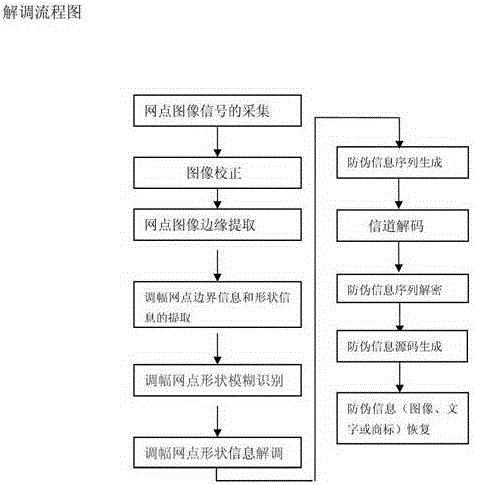Multi-parameter first-order encryption binary anti-counterfeiting printing method
A binary and binary information technology, which is applied to record carriers used in machines, instruments, electrical components, etc., can solve problems such as difficult and effective anti-counterfeiting, confusion between authentic and fake products, and easy forgery of anti-counterfeiting labels
- Summary
- Abstract
- Description
- Claims
- Application Information
AI Technical Summary
Problems solved by technology
Method used
Image
Examples
Embodiment Construction
[0010] In the process of loading anti-counterfeiting information figure 1 Among them, the original anti-counterfeiting information (image, text) is digitized to generate an 8-bit binary anti-counterfeiting information table, and the 8-bit binary information in the binary anti-counterfeiting information table is expanded into a 16-bit binary information to generate a high 8-bit binary information. A 16-bit binary anti-counterfeiting information table whose bits are all 0, and the i-th group of 16-bit binary information in the 16-bit binary anti-counterfeiting information table is denoted as N i , i is a positive integer greater than 0, and the eight-bit binary encryption parameter is denoted as C 1 、C 2 、C 3 , encryption parameter C 1 、C 2 、C 3 It is an integer from 0 to 255. The two-digit binary operator control variable is denoted as k. The operator control variable k is an integer of 0≦k≦3. The operator Using +, ×, -, ÷ four operators, operator control variable k = 0 ...
PUM
 Login to View More
Login to View More Abstract
Description
Claims
Application Information
 Login to View More
Login to View More - R&D
- Intellectual Property
- Life Sciences
- Materials
- Tech Scout
- Unparalleled Data Quality
- Higher Quality Content
- 60% Fewer Hallucinations
Browse by: Latest US Patents, China's latest patents, Technical Efficacy Thesaurus, Application Domain, Technology Topic, Popular Technical Reports.
© 2025 PatSnap. All rights reserved.Legal|Privacy policy|Modern Slavery Act Transparency Statement|Sitemap|About US| Contact US: help@patsnap.com



